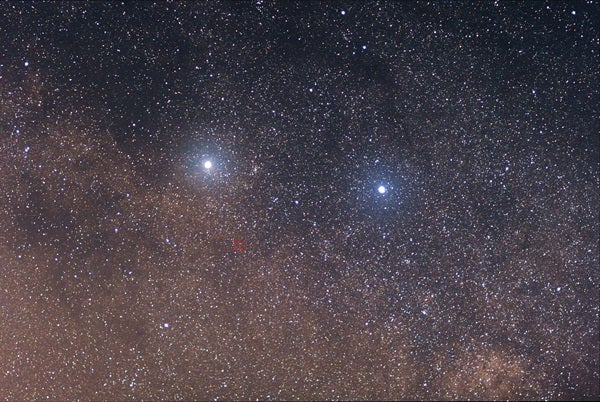The International Astronomical Union (IAU) may have supervillain status among some sky enthusiasts for its decision to demote Pluto from planet to dwarf planet 10 years ago.* Now, they’re going to divide the astronomy community again.
Goodbye, Alpha Centauri. Hello, Rigil Kentaurus.
The decision was announced November 24 as the United States celebrated Thanksgiving. (WAKE UP SHEEPLE!) The IAU gave official designations to 227 stars, making Vega officially Vega, Mizar officially Mizar, Aldebaran officially Aldebaran, and Alpha Centauri its ancient name.
Potentially adding to the confusion, a faint companion to the two stars comprising the now Rigil Kentaurus system, known as Proxima Centauri, has been officially designated by that name. This means the stars are Rigil Kentaurus A and B and Proxima Centauri.
Too many old school astronomers (amateur and institutional) think the change may not be so hard to swallow. Arabic astronomers called the star system Rijl Qanṭūris, which roughly translates to “the foot of the centaur.” Rigil Kentaurus would be a rendering of that name. It was eventually given a Bayer designation of α Centauri, and other stars in the Centaurus nebula given other Greek letters. The names have been used interchangeably, with some observers preferring the Arabic transliteration.
In the end, the amount it matters is nil. People can continue to call it Alpha Centauri, but some star charts may change to reflect the IAU designation. References might get a little tricky without a parenthetical of (aka Alpha Centauri.)
But it’s still the closest main sequence star to us and we’re still on a desperate quest to get there. Proxima Centauri still hosts the nearest exoplanet. We just have to get our Kentauruses and our Centauris straight.
*Full disclosure: This author agrees with the IAU on Pluto, which is not a very popular opinion among our staff and may make me an accessory to super villainy if amateur astronomers ever take over the government.










